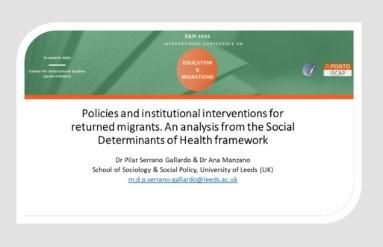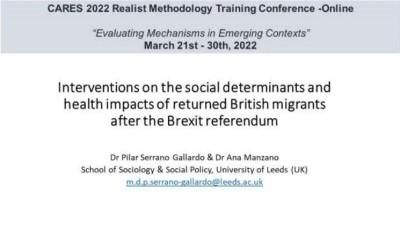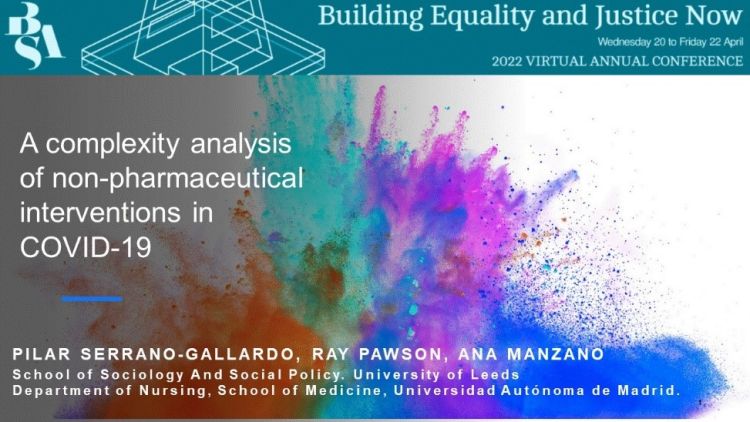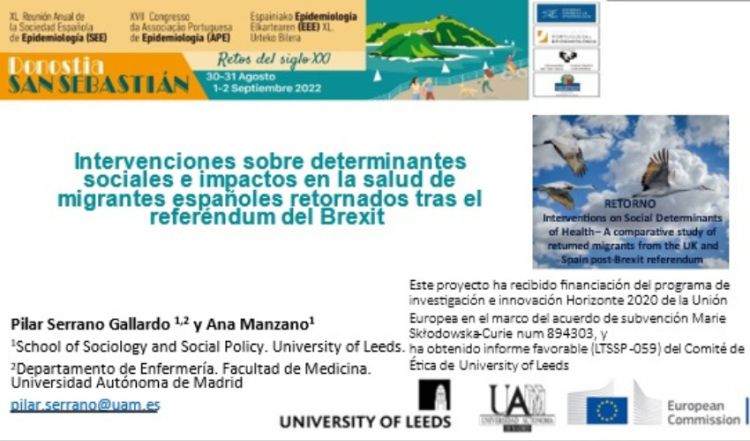Research project
RETORNO: Interventions on Social Determinants of Health – A comparative study of returned migrants from the UK and Spain post Brexit referendum
- Start date: 12 April 2021
- End date: 11 April 2022
- Funding: European Union’s Horizon 2020 research and innovation programme under the Marie Skłodowska-Curie grant agreement No 894303
- Value: €112,466.88
- Primary investigator: 01010748
- Co-investigators: Prof Ana Manzano, Dr Roxana Barbulescu

This webpage is also available in Spanish

ABOUT
Overview
RETORNO study will develop an evidence-based, context-sensitive theory of how intra-EU returned migrants’ health could be improved using the case study of return migration between the UK and Spain post-Brexit referendum.
EU return migration health data is an excellent example of complexity: it is scarce and inevitably heterogeneous, and varies by country, population and setting. The success of interventions on social determinants of health for returned migrants is highly context-dependent, not only in individual countries, but also on the comparison of primary versus secondary care and for people with acute or severe conditions, long-term, compared to healthy migrants.
Objectives
The main objectives of the RETORNO study are:
- To explore how Brexit affects health and social care services provision for returned migrants and the implications for different stakeholders.
- To classify interventions for Social Determinants of Health to understand for whom, under what circumstances, in what respects and why they may impact returned migrants’ health inequalities.
- To identify contextual factors and main mechanisms triggered by interventions and how these impact health outcomes, focusing on gender inequalities.
- To support the design of interventions by providing a unified theory constructed with stakeholders on how public policies on migrant welfare and health may impact citizens returning home after temporary residence in other EU member states.
Methodology
A realist synthesis will be conducted, with a collaborative approach where knowledge users are consulted in the process and outcome of the review. We will carry out stakeholder workshops with participants from UK and Spain. These workshops will be nested along the study in order to map contextual differences, and helping to refine initial knowledge and consolidate study scope and objectives, to validate final findings, and to develop joint strategies for dissemination, including co-design a Handbook on Return Migration and Health.
PEOPLE

Meet the team
Dr Pilar Serrano Gallardo, Marie Skłodowska-Curie Postdoctoral Fellow, School of Sociology & Social Policy (Principal Investigator) – Email: pilar.serrano@uam.es
Dr Ana Manzano, Associate Professor in Public Policy, School of Sociology & Social Policy (Supervisor)
Prof Adrian Favell, Chair in Sociology and Social Theory & Director, Bauman Institute, Deputy Director, Leeds Social Sciences Institute (Mentor)
Dr Roxana Barbulescu, Associate Professor in the School of Sociology and Social Policy (Mentor)
Contact us
We welcome contributions, both within academia and with stakeholders, including citizens. It is our interest to open communication channels, not only to inform about the progress of our study, but also to receive opinions from all interested persons.
For more details on the RETORNO project, contact:
Dr. Pilar Serrano-Gallardo (PI)
Email: pilar.serrano@uam.es
IMPACT
Publications
- A realist synthesis of interventions on social determinants of health for returned migrants: the case of the UK and Spain post-Brexit referendum – Prospero – International prospective register of systematic reviews
-
Serrano-Gallardo P, Mas-Giralt R, Castellani S, et al. Advancing migration and health research by examining return migration. [Advancing migration and health research by examining return migration | School of Sociology and Social Policy | University of Leeds] Journal of Epidemiol Community Health 2024;0:1–6. 5 January 2024
-
Serrano-Gallardo P, Manzano A and Pawson R. Non-pharmaceutical interventions during COVID-19 in the UK and Spain: a rapid realist review [https://open-research-europe.ec.europa.eu/articles/2-52]. Open Res Europe 2022, 2:52
- Serrano-Gallardo P. The challenge of returning. UAM Gazette, 27 July 2022 (https://www.uam.es/uam/investigacion/cultura-cientifica/articulos/retorno-migracion-brexit)
- Serrano-Gallardo P, Mas-Giralt R, Castellani S, et al. J Epidemiol Community Health. doi:10.1136/jech-2023-220670 – Advancing migration and health research by examining return migration - PubMed (nih.gov)
Downloads
-
Policy brief “How to overcome barriers to a healthy return”
-
Policy brief “Promoting the return of human capital”
-
Policy brief “Maintaining mobility rights to reside, work and study”
-
Policy brief “Getting out of limbo
Spanish version
-
Policy brief “Cómo vencer las barreras para un retorno saludable”
-
Policy brief “Promover el retorno del capital humano”
-
Policy brief “Mantener los derechos de movilidad para residir, trabajar y estudiar”
-
Policy brief “Salir del limbo”.
Media
On November 23, 2021 – from the Post Brexit working group, created to coordinate joint initiatives in support of the Spanish community in the United Kingdom, we have launched the Joint Manifesto on the Loss of Rights after Brexit
Interview to Pilar Serrano – Spanish Nursing Council (video)
Interview to Pilar Serrano – CursosFnn (video)
Interview to Pilar Serrano – newspaper DICEN
New Europeans UK – ‘New RETORNO study’
Events
Webinar: “Return to Spain after Brexit” – 22 June 2022 (10am UK time)
The Spanish Ministry of Labour, Migration and Social Security in the United Kingdom and Ireland is organising, together with the Subdirectorate General for Spanish Citizenship Abroad and Return Policies of the Ministry of Inclusion, Social Security and Migration, and in collaboration with the Autonomous Communities of Galicia, Valencia and Madrid, a webinar on Return, which will analyse the challenges that Spanish citizens in the United Kingdom are facing after Brexit when returning to Spain.
More information and registration: https://www.mites.gob.es/es/mundo/consejerias/reinoUnido/index.htm
Seminar: 'Conceptual and methodological considerations about return migration in the European context’
Research Culture Seminar series in SSP. Wednesday 26 January 2022, 13.30 – 14.20 (UK time).
Find out more
Presentation at the International Conference on Education and Migration 2022: 'Policies and institutional interventions for returned migrants. An analysis from the Social Determinants of Health framework'
On March 10 2022, at the International Conference on Education and Migration 2022, we presented, as part of the RETORNO study: 'Policies and institutional interventions for returned migrants. An analysis from the Social Determinants of Health framework'.
The main objective of this work was to identify and analyze interventions aimed at facilitating the return of migrants (avoiding and mitigating negative health impacts), especially after the withdrawal of the United Kingdom from the EU, and focusing on Spanish returnees.

As principal conclusions, we point out that, at the European level, institutional policies and interventions aimed at facilitating the return of the migrant population are mainly focused on the Structural Social Determinants of Health from the development of labour policies that emphasize the return of migrants with high professional qualifications. In Spain, the same pattern is followed, with great variability among the different autonomous communities. The most frequent interventions are those aimed at improving employability and the labour market, especially through the recruitment of highly qualified professional profiles, and economic aid to improve the living conditions of returnees.
Presentation at the CARES (Centre for Advancement in Realist Evaluation and Synthesis) 2022 Realist Methodology Training Conference: 'Interventions on the social determinants and health impacts of returned British migrants after the Brexit referendum'.
On March 24 2022, at CARES 2022 Realist Methodology Training Conference, we presented, as part of results from the RETORNO study: 'Interventions on the social determinants and health impacts of returned British migrants after the Brexit referendum'.
The main objective of this work was to explore how Brexit affects the regulation and provision of health-social care services (examining interventions on social determinants of health), and health status of British returnees from Spain.

As principal conclusions, we point out that, in the context of the UK's withdrawal from the European Union, coupled with the Covid-19 pandemic, and a static and weakened Welfare State with few return policies, there is uncertainty for UK citizens living abroad that may lead to unequal access to health and social care in the UK, as well as in receiving countries if they are unable to return. Administrative procedures are conditional on residence in the UK, and those who have difficulties in travelling (health, socio-economic factors) may decrease their quality of life and increase health problems. It is important to bear in mind that the trajectories of British migrants are often non-linear: the fact that they are pushed to settle in a country means that their project of active and healthy ageing is truncated.
Presentation at the British Sociological Association 2022 Annual Conference "Building Equality and Justice Now" of the paper: "An analysis of the complexity of non-pharmaceutical interventions in COVID-19".
Last April 21 2022, at British Sociological Association 2022 Annual Conference "Building Equality and Justice Now", we presented in the session Medicine, Health and Illness: “An analysis of the complexity of non-pharmaceutical interventions in COVID-19”.

The global fight to contain the COVID-19 pandemic was transformed with the introduction of vaccine programs in early 2021. Before that, nations were forced to rely on a portfolio of social control measures in the effort to quell the transmission of the virus, which leaves us with an intriguing counterfactual question: without the introduction of vaccines, would strategies focused on non-pharmaceutical measures have managed to control the situation?
We used complexity theory framework to examine the Spanish policy response to the COVID-19 pandemic, focusing on non-pharmaceutical interventions implemented before the arrival of the vaccination programme in Europe.
Eight modes of complexity are identified. These are: 1) disparate command and control systems; 2) interaction and emergence; 3) policy discord and moral disharmony; 4) contextual heterogeneity; 5) implementation heterogeneity; 6) ambiguity in regulations and guidelines; 7) temporal change in public attitudes; and 8) exit and sustainability effects.
This classification adapts and extends a framework developed by Pawson, which provides an analysis of the UK COVID-19 response. Each mode is illustrated with evidence from Spain. As conclusions, we highlight that COVID-19 has shown how scientific knowledge is dynamic, disputable, unstable and fluid, presenting an unprecedented societal challenge.
There is not only "pandemic fatigue", but evidence that national interventions of social control in globalized societies have not been adequate. It has been based on a false premise, that in science everything is true, giving binary messages, without contextualizing, without taking into account the social determinants of health.
Presentation at the XL Reunión Anual de la Sociedad Española de Epidemiología (SEE) y XVII Congresso da Associação Portuguesa de Epidemiologia (APE) "Retos del Siglo XXI” of the paper: "Intervenciones sobre determinantes sociales e impactos en la salud de migrantes españoles retornados tras el referéndum del Brexit”
Last August 31 2022, at the XL Reunión Anual de la Sociedad Española de Epidemiología (SEE) y XVII Congresso da Associação Portuguesa de Epidemiologia (APE), we presented, as part of results from the RETORNO study: "Intervenciones sobre determinantes sociales e impactos en la salud de migrantes españoles retornados tras el referéndum del Brexit”
The main objectives of this work were to explore how Brexit is affecting the provision of health and social care services for migrant returnees from the UK to Spain, examining interventions on the social determinants of health, as well as the implications for different stakeholders; and to identify the contextual factors and main mechanisms triggered by the interventions and how these impact on health outcomes.

As principal conclusions, we note that three patterns were identified.
- Disaffection": Difficulties in the recognition of academic and professional careers, generating disaffection with the country of origin and obstacles in professional and academic development, leading to inequalities in well-being and impacts on mental health, further exacerbated by disruptive and uncertain events such as Brexit and the Covid-19 pandemic.
- "Lost and forsaken: jumping into the void": Conditionality on residence and employment on benefits and services in the country of origin (housing, schooling, family reunification, health and social services), related to a static welfare state, with different levels of governance, hinder health maintenance and lead to worsening chronic problems and disability.
- "Empowerment for action": Return programmes aimed at "attracting talent" can contribute to developing "feelings of agency" (empowerment to take action to improve the country of origin and its community), generating positive effects (self-esteem, well-being and control of life), although the "elitist" nature of the actions can have the opposite effect.
There is evidence of inequalities in access to social and health services for Spanish returnees from the United Kingdom after Brexit. There are delays in treatment and health checks, which can lead to worsening health problems and disability. There is a negative impact on well-being and quality of life, as well as on health, especially at the psycho-emotional level.
Participation as an academic expert in the Forum for the Design of the Return Strategy of the Valencian Community.
First workshop held on 22 June 2022 (https://retornogva.es/)
RESOURCES

Related websites
The Centre for Ethnicity and Racism Studies (CERS)
Autonomous University of Madrid – Department of Nursing, Faculty of Medicine
Other relevant resources
Coalición de Españoles en el Reino Unido
Consejo de Residentes Españoles en el Centro UK
Consejo de Residentes Españoles en el Norte UK
IMISCOE (International Migration, Integration and Social Cohesion in Europe)


